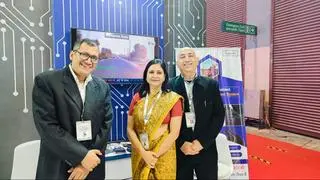Jacob Thekkekara and Visakh Sasikumar proudly show off the tricycle they have designed. We are at the IITM Research Park in Taramani, Chennai, and Jacob pedals a short distance on the tricycle to show how easy it is. Of course, the tricycle is not carrying any load. But, still with the pedal-assist technology that the duo has provided on it, they say it should be a cinch to move around with the 250-kg payload that it can carry.
The two have founded a company Pi Beam Labs, incubated at the IITM Research Park, which has sold one vehicle, to French multinational tyre maker Michelin for use in its plant near Chennai, to move materials inside the factory. It has orders for at least 30 more, which it hopes to fulfil in the next few months.
Looking for fundsJacob, 32, Chief Technology Officer, and Visakh, 27, Chief Executive Officer, Pi Beam, are in the process of raising about ₹1.5 crore that they will use to strengthen the team, especially marketing capabilities.
Both of them are engineering graduates from Kerala and worked in different companies before landing up at IIT-Madras to pursue Master’s in different programmes. That is where they met.
Visakh had registered a company to do something on renewable energy, but was stuck because his co-promoters had walked out of the venture for different reasons. That the two met up on campus proved fortuitous as Jacob’s mechanical engineering background came in handy when they decided to pivot and pursue the pedal-assist tricycle business.
After studying the design faults in some of the tricycles that were in the market, Pi Beam has adopted a single frame modular chassis for the vehicle, which overcomes problems of alignment in some of the other models. The vehicle has a proprietary assist technology, where the rider can choose how much assistance he or she wants from the motor. It has an intelligent torque management system through which the torque sensor communicates the assistance required to the controller, which, Jacob says, describes as the vehicle’s brain.
Torque sensor“The moment you apply a force on the pedal, the torque sensor will sense the torque that is being applied and as per the logic, the motor will kick in. So, then the effort (of pedalling) reduces right from the very beginning itself,” says Jacob. “It is completely pedal assisted. You have to keep pedalling and the motor will run simultaneously,” he adds.
“We have the entire chassis design. We have validated whether it will withstand the load,” says Jacob. Pi Beam sources the components from vendors and assembles the vehicle at the IITM Research Park.
Thanks to the incubation ecosystem, the two were able to tap into mentors from different fields to help in their project. MM Murugappan of the Chennai-based Murugappa group, is one of the mentors at the research park and through him, Pi Beam was able to connect to TI Cycles, which is part of the Murugappa group, to fine tune their supply chain management.
Three variantsPi Beam’s tricycle comes in three variants – the basic model Titan priced at ₹30,000, Pluto at ₹60,000 and Mercury at ₹90,000. Titan has only the manual option, but has disc brakes and a gear mechanism. Pluto is the entry level electric tricycle with a 250W motor, intelligent torque management system and an optional gear mechanism. Mercury, the top-end model, has a 400W electric motor, and has facilities for solar charging of the battery. The canopy covering the cargo has solar panels that can charge the battery on the go. The solar panels are sourced from Cygni, another IITM-incubated company.
According to Visakh, their venture has three potential markets that it can address. One is the private work spaces, which includes all factories, IT parks and universities. The latter two for moving people around. “Whatever space you take, they have something that needs to be carried,” he explains. Then there are the public work spaces, which includes various applications for moving cargo such as gas cylinders, garbage collection and ice cream carts. The third category, according to him, is where last mile connectivity is required – say, from a metro rail station to the nearest bus stop. These vehicles are non-polluting and will find use in smart cities that are being set up in India, he adds.
Besides, says Visakh, there is a huge export market that is waiting to be tapped. In Bangladesh, Malaysia and Thailand, these tricycles can be used for public transportation or for ferrying tourists in pilgrimage spots. The vehicle has a top speed of 25 km an hour.
“We have got initial orders. We need to deliver them, make them happy customers,” says Visakh. Michelin alone, he adds, has requirement for quite a few more of these vehicles, which they hope to tap into.
Expansion plansTheir plan is not to set up a plant, but be asset light and source components from various vendors. The company that supplies them the frame can easily handle up to 50,000 orders a year, adds Visakh. They initially plan to concentrate on Chennai and Bengaluru, then move into other cities such as Mumbai, Pune and Amaravati (the new capital of Andhra Pradesh) and the many smart cities that are coming up.
“Fourth year is the year of scale up. If we feel that we have enough orders and we are generating revenues and it makes sense to have a factory, then we will put up one,” says Visakh.








Comments
Comments have to be in English, and in full sentences. They cannot be abusive or personal. Please abide by our community guidelines for posting your comments.
We have migrated to a new commenting platform. If you are already a registered user of TheHindu Businessline and logged in, you may continue to engage with our articles. If you do not have an account please register and login to post comments. Users can access their older comments by logging into their accounts on Vuukle.